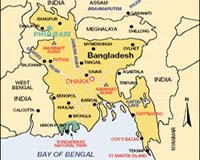 |
Tadcaster, England (UPI) Jul 27, 2009 A British university has quietly resumed growing genetically modified potatoes a year after protesters ripped up the crop, prompting calls of foul play. The 400 plants in the field near Tadcaster, 15 miles east of Leeds and 10 miles west of York, were originally removed in May 2008, just weeks after planting, as a result of damage caused by unidentified environmentalists. The project has been restarted without alerting the public, as is usual when such trials begin, prompting environmental groups to warn that local farms and residents could be at risk, The Daily Telegraph reported. Britain's Department for the Environment Food and Rural Affairs maintains an original three-year permission to plant the potatoes remains valid, so the University of Leeds crops can be replanted without having to provide further notice. Campaigners accused government ministers of trying to "slip it under the radar," the Telegraph said. The agency said the potatoes, genetically engineered by Leeds to be resistant to a microscopic parasitic worm called a nematode, will not be used for human or animal consumption. The nematode costs British farmers more than $100 million a year. The potatoes are being grown in a safe environment, with no risk of contamination, next to plants that will later be destroyed, the agency said. The whole area will then be left fallow for several years after the trial, the agency said. Government officials are being lobbied by biotechnology companies and support for genetic engineering is growing again as experts warn of food shortages caused by the growing population and climate change. A Leeds University spokesman told the Telegraph the trial could boost industry and feed people. Share This Article With Planet Earth
Related Links Farming Today - Suppliers and Technology
 Free electricity for drought-hit Bangladesh farmers
Free electricity for drought-hit Bangladesh farmersDhaka (AFP) July 25, 2009 Bangladesh has ordered free electricity for millions of farmers to pump underground water after a severe lack of monsoon rains threatened its main rice crop, an official said Saturday. Downpours normally lash Bangladesh from June to September and the impoverished South Asian country gets more than 75 percent of its annual rainfall during this period. But the country's weather department ... read more |
|
| The content herein, unless otherwise known to be public domain, are Copyright 1995-2009 - SpaceDaily. AFP and UPI Wire Stories are copyright Agence France-Presse and United Press International. ESA Portal Reports are copyright European Space Agency. All NASA sourced material is public domain. Additional copyrights may apply in whole or part to other bona fide parties. Advertising does not imply endorsement,agreement or approval of any opinions, statements or information provided by SpaceDaily on any Web page published or hosted by SpaceDaily. Privacy Statement |